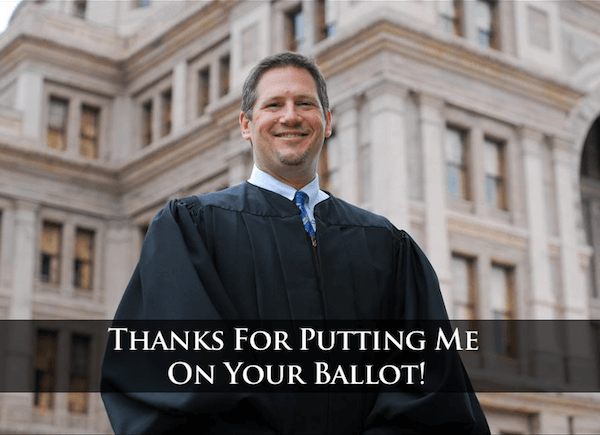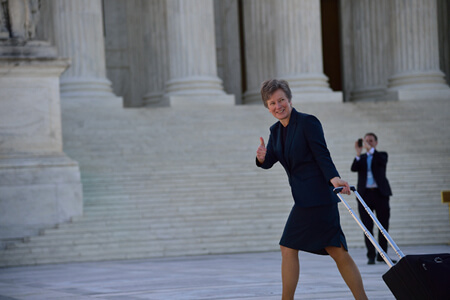Paul Clement, outside counsel to the House Bipartisan Legal Advisory Group, who filed a brief last week arguing that DOMA is constitutional.
On January 22, attorneys defending California’s Proposition 8 and those defending the federal Defense of Marriage Act (DOMA) against constitutional challenges filed briefs on the merits with the United States Supreme Court.
Given what they were defending, the two briefs struck me as extremely well written and well argued, and though the two cases have significant differences, similar arguments dominated both.
Charles Cooper, Paul Clement argue marriage fundamentally about protecting children
In the Prop 8 case, the Official Proponents of the 2008 voter initiative are appealing a Ninth Circuit Court of Appeals ruling that it violated the 14th Amendment’s Equal Protection Clause by withdrawing from same-sex couples, without any rational basis, a right to marry previously recognized by the California Supreme Court. The Official Proponents have, to date, been allowed to intervene in defense of Prop 8 in the absence of either the California governor or the state attorney general doing so. Charles Cooper, a leading conservative appellate advocate who served in the Reagan administration, filed the brief on their behalf.
In the DOMA case, a majority of the Bipartisan Legal Advisory Group (BLAG) of the House of Representatives — which includes the three most senior Republicans and the top two Democrats, split along party lines in their view of the case — argues that Congress did not violate the equal protection requirements of the Fifth Amendment in 1996 when it adopted the statute’s Section 3, which bars federal recognition of same-sex marriages. Paul Clement, the US solicitor general under President George W. Bush, is BLAG’s outside counsel.
Prop 8’s Official Proponents lost at the district court level, when Judge Vaughn Walker ruled that same-sex couples have a federal constitutional right to marry. The Ninth Circuit affirmed Walker, but on the narrower ground that California’s voters had no rational basis to rescind the right to marry.
Beyond the merits of the case, a secondary issue before the high court is whether the Official Proponents have constitutional standing to bring the appeal, since the governor, attorney general, and other state officials were the named defendants in the case and have declined to appeal the Ninth Circuit ruling.
Attorney Cooper’s January 22 brief tackles both questions.
The Ninth Circuit earlier considered the question of the Official Proponents’ standing, and asked the California Supreme Court for an advisory opinion on whether state law authorizes initiative proponents to represent the state’s interest in defending against a federal court challenge. That court found proponents have such authority, and the Ninth Circuit subsequently ruled the Official Proponents could pursue their appeal of Walker’s ruling.
Cooper’s brief points out that the Supreme Court has in the past recognized the right of a state to determine who, apart from state officials, is authorized to represent the state’s interest when the state does not step up. Still, the California Supreme Court’s advisory opinion dealt with state law only, so it is likely that the American Foundation for Equal Rights, representing the two plaintiff couples challenging Prop 8, will make strong counter-arguments when they file their brief in February.
Cooper’s brief on behalf of the Official Proponents casts the case as one about federalism — the division of authority between the state governments and the federal government. The question of who could marry has traditionally been a matter of state law and, as the brief argues, is a policy question typically determined through the legislative process. The California Constitution allows voters to legislate directly by initiative, and it was an earlier referendum banning same-sex marriage that the State Supreme Court overturned in its 2008 marriage equality decision. Prop 8 voided that ruling by a constitutional amendment. This process, Cooper’s brief argues, illustrates the democratic process at work, one the federal courts should not interfere with.
The Official Proponents’ brief doesn’t rest solely on the federalism argument. As they did before the Ninth Circuit, they also argue that California has a rational basis for treating same-sex and opposite-sex couples differently. Using the same argument that BLAG employs in defending DOMA, Cooper’s brief argues that since different-sex couples have direct procreative capacities same-sex couples lack, the two classes are not “similarly situated.” The brief cites prior Supreme Court rulings to assert that this is an essential element in any equal protection claim based on differential treatment.
Regardless of whether the high court finds an equal protection claim at stake, the Cooper brief argues it would be rational for California to distinguish between different-sex and same-sex couples, since the fundamental purpose of marriage is to “channel procreation” by different-sex couples into a stable family institution — an argument that earlier proved decisive when the highest courts of New York, Maryland, and Washington State denied state constitutional claims by same-sex couples for the right to marry. The subsequent adoption of gay marriage rights through a legislative or initiative process in all three states are examples the Official Proponents would cite of the political process at work without the need for court intervention.
Those examples are certainly cited by Clement in his DOMA brief on behalf of BLAG. As in the Prop 8 case, the 1996 federal law’s defenders have adopted federalism as their main argument. They contend that DOMA was a rational response by Congress to an unfolding situation in the mid-1990s after the Hawaii Supreme Court ruled same-sex couples might have a right to marry under the State Constitution. Faced with the prospect that gay and lesbian couples nationwide could marry in Hawaii and demand recognition from their home states and the federal government, members of Congress and presidential contenders, looking to the November election that year, rushed to take positions against same-sex marriage.
Clement’s brief was a rational, tempered response, which argues that DOMA was enacted to allow states to retain control over the definition of marriage and the federal government to maintain national uniformity in applying federal law by adopting the traditional definition of marriage then in effect everywhere. The brief asserts that the Constitution is silent on the definition of marriage, leaving states and the federal government free to define it for purposes of their respective laws.
Though the US government has customarily treated anyone married under the laws of their home state as married under federal law, the brief argues there is no constitutional requirement for this. Congress, it asserts, has at times adopted a particular definition of marriage, most notably for certain tax code purposes. Putting the traditional definition of marriage into federal law, Clement contends, was consistent with Congress’ role in enacting hundreds of different statutes that take marital status into account. He also asserts that Congress could rationally have anticipated that if some states adopted same-sex marriage, the lack of a uniform federal definition might lead to administrative confusion, inequities, and uncertainties — as well as significant costs from creating overnight a new class of claimants for federal benefits.
The BLAG brief also directly takes on the Second Circuit’s ruling, in the claim brought by New York widow Edie Windsor, that DOMA should be subjected to “heightened scrutiny,” which places a higher burden on the government in justifying the law. Here, Clement makes essentially the same argument Cooper does in the Prop 8 brief about same-sex and different-sex couples not being similarly situated. Though same-sex couples are adversely affected by DOMA, he argues, the law does not directly discriminate on the basis of sexual orientation, since other factors distinguish the two situations.
Clement also asserts that gay people lack other characteristics that would subject DOMA to a heightened scrutiny standard. He argues that recent history shows gay people are not politically powerless.
“Gays and lesbians are one of the most influential, best-connected, best-funded, and best-organized interest groups in modern politics, and have attained more legislative victories, political power, and popular favor in less time than virtually any other group in American history,” Clement writes, in arguing that the community does not need the assistance of heightened scrutiny by the courts to protect their interests.
He also disputes that there is a long history of discrimination against gay people by the federal government, citing gay historians to the effect that most overt discrimination dates back to the early 20th century, since the concept of homosexuality itself emerged only in the mid-19th century. Clement’s assertion conveniently overlooks the capital punishment that traditional English law prescribed for “sodomites,” whether or not they were called homosexuals.
Like Cooper in his Prop 8 brief, Clement adopts the view that the government’s “legitimate” interest in distinguishing between same-sex and different-sex couples is based on the need to channel heterosexual procreation.
What is striking about both the Prop 8 and DOMA briefs is what is missing. Neither goes in for gay-bashing, asserts that prohibitions on same-sex marriage can be justified by moral disapproval, or contends that gay couples are inadequate as parents. Both briefs are carefully written to project a matter-of-fact tone about rational decision-making.
What they also leave out is any reference to love and affection having anything to do with marriage. Both briefs essentially argue that marriage is about children, not about the spouses, and that the great “danger” of “redefining” marriage to be “genderless” is in putting the prime focus on the marital partners instead of the family. Neither brief acknowledges the substantial percentage of same-sex couples raising children and the ways in which their exclusion from a marital home may be harmful to them. Instead, Cooper and Clement harp on studies showing the disadvantages suffered by children raised by single mothers whose fathers have abandoned them.
Both briefs, for the most part, ignore the huge structure of legal rights and responsibilities attached to modern marriage in America, paring the institution down to its rudimentary essentials in the pre-modern state. In other words, they are appealing to the “originalists” on the high court, as Cooper makes clear when he expresses incredulity that anyone would contend that the generation that enacted the 14th Amendment in 1868 intended to confer the right to marry on gay and lesbian couples. Those on the high court who regard the 14th Amendment as establishing general concepts of fairness and equality rather than a specific image based on mid-19th century life will, one hopes, reject this view.
There is a reasonable prospect that Justice Anthony Kennedy, the swing vote on the court, may be among that group. In the conclusion of his opinion in the 2003 Lawrence v. Texas sodomy case, he wrote, “Had those who drew and ratified the Due Process Clauses of the Fifth Amendment [1791] or the Fourteenth Amendment [1868] known the components of liberty in its manifold possibilities, they might have been more specific. They did not presume to have this insight. They knew that times can blind us to certain truths and later generations can see that laws once thought necessary and proper in fact serve only to oppress. As the Constitution endures, persons in every generation can invoke its principles in their own search for greater freedom.”
A month from now, those challenging Prop 8 and DOMA will file their briefs, and Cooper and Clement will receive their responses. The cases will be argued on March 26 and 27.




































